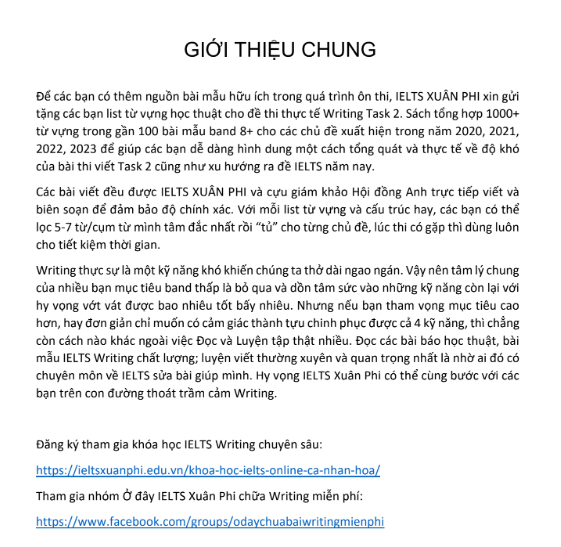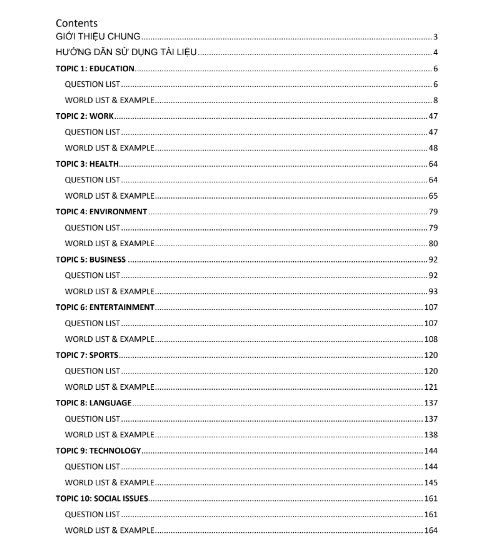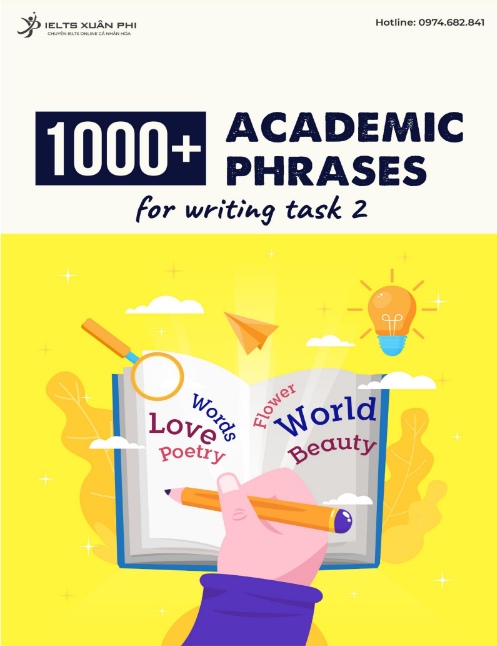


Mục lục
ToggleBẢNG 1 – ĐỀ 31/10/2020
Question:
People say that it is a waste of time for high school students to learn literature such as novels and poems. Do you agree or disagree?
WORD LIST
| ENGLISH | TIẾNG VIỆT |
|---|---|
| Practical value | Giá trị thực tiễn |
| Moral orientation | Định hướng đạo đức |
| Fundamentally (adj) | Về cơ bản |
| Fictional (adj) | Giả tưởng |
| Moral development | Phát triển nhân cách |
| Empathise (v) | Đồng cảm |
| Subjective judgements | Đánh giá/Phán xét một cách chủ quan |
| Contradicting opinions | Ý kiến trái chiều |
| Cherish (v) | Trân trọng |
| Open-minded (adj) | Cởi mở/sẵn sàng tiếp thu những cái mới |
| Testaments (n) | Bằng chứng/Minh chứng |
| Curriculum (n) | Chương trình giáo dục |
| Impractical (adj) | Không thực tế/Không thực tiễn |
| Nurture (v) | Nuôi dưỡng |
EXAMPLE
Some people argue that teaching literature in high schools is a sheer waste of time since it has little to no practical value. However, I contend that it provides essential moral orientation to students.
On the one hand, high schoolers might find it hard to apply literature lessons to real life. More specifically, writers or poets compose their works at a time that is fundamentally different from the present teenager’s world. More importantly, characters in novels are clearly fictional, possessing a set of behaviours that are not always relatable in modern terms. For instance, throughout the poem “Odyssey”, the hero resolved to use violence to settle all disagreements, an approach that would not work in our current, more peaceful civilisation.
On the other hand, it appears to me that this subject is crucial to the moral development of those at high school. While studying novels or poems, they are able to empathise with the characters, understanding their circumstances in the given settings instead of making subjective judgements. As a result, young learners would likely become empathetic graduates who are willing to appreciate contradicting opinions and cherish differences, eventually becoming more open-minded citizens. That is a testament why literature should be included in school curriculum.
In conclusion, although novels or poems may seem to be impractical, I am convinced that literature must have a place in high school programs to nurture well-educated citizens. Nevertheless, teachers should adopt more creative teaching methods such as role playing or plot construction to make lessons more relevant to their students.
(Word count: 256 words)
BẢNG 2 – ĐỀ 07/11/2020
Question:
Some people say that outdoor activities bring more benefits to children’s development rather than computer games. To what extent do you agree or disagree?
WORD LIST
| ENGLISH | TIẾNG VIỆT |
|---|---|
| Overall growth | Sự phát triển toàn diện |
| Physical potential | Tiềm năng thể chất |
| Regular exercise | Hoạt động thể chất thường xuyên |
| Playground activities | Hoạt động ngoài sân chơi |
| Increase appetite | Tăng sự ngon miệng |
| Sedentary lifestyle | Lối sống ít vận động |
| Shortage of essential nutrition | Thiếu hụt các chất dinh dưỡng cần thiết |
| Precursor to something | Dấu hiệu/điềm báo cho cái gì |
| Stay in touch with nature | Gần gũi với thiên nhiên |
| Spatial visualisation | Hình dung về không gian |
| Scientifically proven | Được khoa học chứng minh |
| Conducive to something | Có lợi cho cái gì |
| Facilitate | Tạo điều kiện |
| Lavish time on something | Phung phí thời gian vào cái gì |
EXAMPLE
It is sometimes argued that doing activities outside is more advantageous to a child’s overall growth in comparison to playing games on computers. I completely agree with that argument because of the two following reasons.
Firstly, in contrast to computer games, outdoor activities allow children to reach their full physical potential. Regular exercise resulting from ball games or playground activities likely increase appetite and foster the process of metabolism that break down food into minerals and proteins, building more muscles, stronger joints and bones. By contrast, video games tend to encourage a sedentary lifestyle, slowing down both digestion and metabolism. That possibly causes young gamers to suffer from a shortage of essential nutrition and the failure to discharge noxious substances, which is a precursor to malnutrition or frailty.
Secondly, playing outside tends to nurture important mental abilities. For example, it offers kids a chance to stay in touch with nature, observing various objects, shapes and colours in diverse sizes and positions, which would boost children’s spatial visualisation. In addition, children seem more excited to engage in face-to-face conversation with their peers in the open air than via a laptop screen. This kind of talk is scientifically proven to be conducive to the development of verbal communication skills that are crucial for future success at school and beyond.
In conclusion, I am of the opinion that outdoor games are superior to computer-based ones in facilitating both body growth and mental capabilities in children. That is why parents should encourage their offspring to spend at least a few hours a day to be at playgrounds instead of lavishing time on computers or game consoles.
(Word count: 274 words)
BẢNG 3 – ĐỀ 16/01/2021
Question:
Some people think students should study the science of food and how to prepare it. Others think students should spend time on important subjects. Discuss both views and give your opinion.
WORD LIST
| ENGLISH | TIẾNG VIỆT |
|---|---|
| Boost career prospects | Tăng triển vọng sự nghiệp |
| Foundational knowledge | Kiến thức nền, kiến thức căn bản |
| Smoothly transit into a professional working environment | Suôn sẻ áp dụng vào môi trường làm việc chuyên nghiệp |
| Prerequisite (n) | Điều kiện tiên quyết |
| Focus diligently on sth | Tập trung chuyên sâu vào cái gì |
| A solid understanding of.. | Một sự hiểu biết tốt về… |
| Be detrimental to the healthy growth | Có hại cho sự phát triển khỏe mạnh |
| Culinary skills | Kỹ năng nấu ăn |
| Dietary patterns | Chế độ ăn uống |
| Readily available dishes | Các món ăn được chuẩn bị sẵn |
| Prioritize traditional school curriculum | Ưu tiên chương trình giảng dạy truyền thống |
| Impart a knowledge of sth | Truyền đạt kiến thức về cái gì |
EXAMPLE
People have different views concerning the importance of studying food science and cooking at educational institutions. While some argue that students should focus on key subjects that can boost their career prospects, I believe culinary courses are of paramount significance in leading a healthy and independent lifestyle.
On the one hand, the core disciplines standard at most schools are imperative for one’s future career. Academic subjects such as math and literature can provide an individual with the foundational knowledge to smoothly transit into a professional working environment. For example, logical thinking acquired during math lessons and critical thinking fostered by literature are prerequisites to nuanced problem-solving skills. Recent research has indicated that the average income of those with the abovementioned competencies is higher than that of unskilled laborers and the general workforce. Therefore, a successful career is a realistic possibility when one focuses diligently on the important subjects at school.
On the other hand, possessing a solid understanding of food and cooking can ensure not only general well-being but also serve as a basic survival skill. First and foremost, schoolers often fail to attend to nutrition in their daily meals, which likely leads to unhealthy eating habits. Conditions caused by those occupations such as malnutrition and obesity are detrimental to the healthy growth of the younger generation. Secondly, food preparation is useful for living independently. Students who are proficient with culinary skills will be more capable of adjusting to living on their own. Indeed, food science and cooking could enable them to modify their dietary patterns to live healthier without either readily available dishes at homes or processed foods at convenience stores.
In conclusion, while some advocate prioritizing traditional school curriculums based on academic subjects, I believe imparting a knowledge of nutrition and food preparation generates a great sense of independence and develops healthy eating habits for graduates. Thus, courses about food should be added to the school curriculum.



